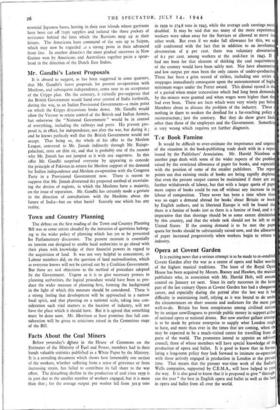Facts About the Coal Miners
Before yesterday's dtbate in the House of Commons on the Estimates of the Ministry of Puel and Power, members had in their hands valuable statistics published as a White Paper by the Ministry. It is a revealing document which shows how lamentably one section of the workers, whether suffering from a sense of grievance or from increasing strain, has failed to contribute its full share to the war effort. The disturbing decline in the production of coal since 1939 is in part due to the smaller number of workers engaged, but it is more than that ; for the average output per worker fell from 301.9 tons
in 1939 to 274.8 tons in 1943, while the average cash earnings near doubled. It may be said that too many of the more experienc workers were taken away for the Services or allowed to move in other work. But even if we make full allowance for this, we still confronted with the fact that in addition to an involunt absenteeism of 9 per cent, there was voluntary absenteei of 6.i per cent. among workers at the coal-face in 1943. If had not been for that element of shirking the coal requiremen of the country would have been safely met. Nor have absenteei and low output per man been the only- causes of under-producti There has been a grim record of strikes, including one series stoppages immediately consequent upon the announcement of high minimum wages under the Porter award. This dismal record is of a period when major concessions which had long been demand by the miners were granted and when wages were higher than th had ever been. These are facts which were very wisely put liefo Members about to discuss the problem of the industry. There nothing in them to .weaken the demliand for a far-reaching policy reconstruction.; just the contrary. But they do show grave faul other than those of the employers and the Government. Sometlf is very wrong which requires yet further diagnosis.


























 Previous page
Previous page